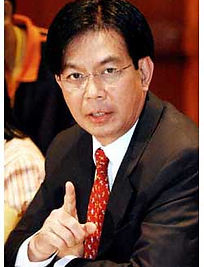
Panfilo Lacson
BORN: June 1, 1948 Imus, Cavite
INDEPENDENT
Running for the third time in the Senate, Panfilo Lacson wants to prove that he can file more bills to improve the country. Good governance and peace and order is his battle cry from the time he was a member of the police force to his term as senator of the country.
Born on June 1, 1948 in Imus, Cavite, Panfilo Lacson was honed to be one of the most influential leaders of the country. His hometown was the primary place where his philosophies in life were shaped – he studied in Bayang Luma Elementary School in 1954 to 1960 and in Imus Institute in 1960 to 1964 during his primary and secondary years. In his tertiary year, he studied Engineering in the Lyceum of the Philippines in 1964 to 1967.
Lacson entered the Philippine Military Academy (PMA) in 1967. After graduating from the PMA in 1971, he decided to apply the principles that he has learned by entering the Philippine Constabulary (PC) – Metrocom Intelligence and Security Group.
In 1986, he decided to join the PC - Integrated National Police Anti-Carnapping Task Force. In 1988, he became the provincial commander of Isabela. In 1992, he became the provincial director of the PC in Laguna.
After deciding of taking the path towards managing the government, he studied in Pamantasan ng Lungsod ng Maynila in 1995 with a master’s degree in government management. During President Joseph Estrada’s administration, he was appointed to head the Organized Crime Task Force.
In 1991, he was appointed as the Chief of the Philippine National Police, which is the PC back then. Before he was appointed as chief, policemen were known to be “Inept, Corrupt, and Undisciplined”, which he called “I.C.U.” During this time, victims, instead of running into policemen for help, run away from them because of their negative image. In fact, surveys said that the net satisfaction rating of the PNP was negative 18.
During his 14-month term as Chief of the PNP, the institution achieved a 58% public approval rating which is the highest in PNP’s history. He cured the “ICU” image of the police through his “A.I.D” which means “Aptitude, Integrity, and Discipline”.
Also, he was known for his term due to the discipline and morale instilled in the national police force, including its officers – this included the ceasing of corrupt police officers’ act of “carnapping” recovered stolen vehicles, and eradicating “kotong” culture among policemen, where the officers get money from people unreasonably.
Lacson decided to run as senator under the Laban ng Demokratikong Pilipino (LDP) in the 2001 elections, where he won the tenth seat in the Senate. LDP was affiliated with President Estrada’s Puwersa ng Masa coalition.
Despite his achievements, Lacson and 33 other police officials faced a case in the Quezon City Regional Trial Court in 2003 regarding the linkage of the Presdiential Anti-crime Commission (PACC) and the killing of 11 members of Kuratong Baleleng. The trial court, however, dismissed the criminal case due to absence of probable cause.
In late 2006, he considered running as mayor in the city of Manila for the 2007 elections but later, he settled to the decision that he will run for a re-election in the Senate. In the 2007 senatorial elections, he ran under the Genuine Opposition coalition, and had ranked third in the senatorial seat.
In 2009, Cezar Mancao named Lacson as the mastermind of the murders of Dacer and his driver Emmanuel Corbito. Mancao was allegedly present when Lacson gave the hit order to then police senior superintendent Michael Ray Aquino sometime in October 2000. Lacson denied these allegations, stating that the Office of the President had pressured Mancao to sign the affidavit.
On February 5, 2010, the Regional Trial Court in Manila issued an arrest warrant against him. On February 12, 2010, Interpol issued an international notice for Lacson. On February 3, 2011, the Court of Appeals withdrew the murder charges against the senator citing Mancao as "not a credible and trustworthy witness".
Lacson filed 41 bills that aimed to improve public service, enhance reproductive health, promote investments, and bolster the country’s defense capabilities. As a legislator who has an experience in the law enforcement sector, he also intended to introduce bills that would affect the Criminal Justice System of the country.
He primarily authored the Anti-Money Laundering Control Act of 2001 and the Anti-Human Trafficking Act of 2001. Lacson was one of the main authors of two milestone legislative measures of the Aquino administration -- the Reproductive Health Act and the Sin Tax Reform Act.
RH Law aims to promote responsible parenthood and to protect the health of the mother and child by giving them access to reproductive health services. Another bill he has passed is the sin tax reform which imposes higher taxes on tobacco and alcohol products. This bill was signed by President Aquino into law as Republic Act 10351.
Lacson authored Senate Bill No. 2783, which strengthened further the Anti-Money Laundering Act of 2001. His work is now part of Republic Act No. 10167, which was approved and signed into law June 18, 2012.
To date, Senator Lacson is working on legislation to fight the problem of terrorism through the passage of the Anti-Terrorism bill and to alleviate the condition of various sectors of society including students, contractual workers, police, military, and fire protection personnel. The Senator is strongly against the pork barrel system, and he refuses to use his pork barrel funds. Lacson has brought with him his principle that he applied to his life being a public servant: “What is right must be kept right. What is wrong must be set right”.
References
ABS-CBN.com website
http://news.abs-cbn.com/botomo/05/13/09/profile-panfilo-ping-morena-lacson
Ping Lacson website
Senate of the Philippines website-